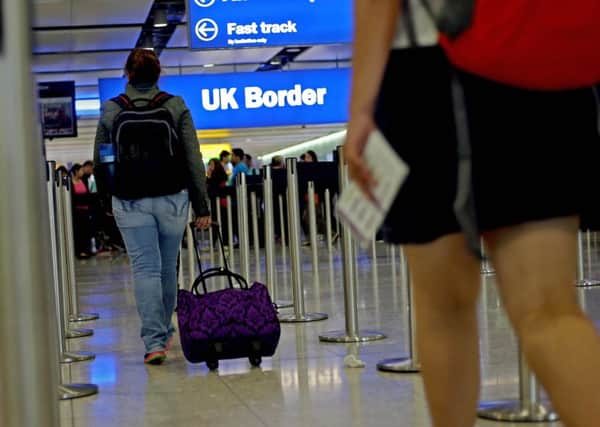Escalate '˜racist' immigrant policy but no border checkpoints: Senator


That’s according to Fianna Fáil Senator Mark Daly who has repeatedly criticised Operation Gull, an Anglo-Irish joint initiative that’s been targeting suspected breaches of the Common Travel Area (CTA) for a decade.
Senator Daly has warned Britain is likely to ratchet up the controversial immigration policy post-Brexit given the porous nature of the border in Ireland.
Advertisement
Hide AdAdvertisement
Hide AdHe said London was clearly worried that the North will be used as a backdoor by migrants who will fly into Dublin before travelling to Derry and Belfast and then onward to Britain.
“The simple solution is for the UK to upscale Operation Gull. Operation Gull is a tragically racist policy whereby people getting onto aeroplanes in Derry and Belfast and the ships in Larne are profiled to see if they are likely to be non-EU nationals trying to get into Britain through the backdoor,” said Senator Daly, speaking during a debate in the Seanad.
The Cork-based Fianna Fáil Senator advised the Seanad how 792 people trying to get into Britain through Derry, Belfast or Larne were stopped and arrested under Operation Gull during one recent calendar year alone.
Notwithstanding the controversial aspects of the operation, Senator Day suggested it may be escalated by the British authorities in the North to stop onward migration from Ireland.
Advertisement
Hide AdAdvertisement
Hide AdRegardless of what Britain decides to do, Senator Daly said the Dublin government must not countenance checkpoints on its side of the frontier.
“It is up to Britain as to whether it puts checkpoints on its side of the Border.
“We do not have to and it is up to us as to whether we do,” he said.
Senator Day went on: “We say that if the United Kingdom wants to secure its border, that is the place to do it.
Advertisement
Hide AdAdvertisement
Hide Ad“There is no point in trying to put 40,000 troops back on the Border again, such as in the Troubles. The Border could not even be sealed when lives were on the line.
“Now that it is an immigration issue, there is no point in stopping 40,000 people trying to go over and back across the Border to work and to school every day.
“Implement Operation Gull and do immigration checks between Northern Ireland and Britain, as was done between 1939 and 1952.
“For political reasons, the DUP says that it is not going to accept internal border checks within Northern Ireland.
Advertisement
Hide AdAdvertisement
Hide Ad“It is a simple solution to a practical problem but unfortunately, politics is the issue that might stop it.”
Recently, Professor Colin Harvey, a lecturer in Human Rights Law, at the Queen’s University, Belfast, referring to Operation Gull, warned that political leaders in Ireland needed to guard against the danger of an increasingly anti-immigrant policy emerging in London.
“I genuinely think that on this island we need to start a new conversation about where we want to go on some of these issues, including immigration, asylum and refugee policy,” he said.
“The Westminster Government is going, in my view, to a bad place in respect of some of these issues and we must bring our mind to these questions. For example, does the Westminster approach to immigration and asylum suit us in Northern Ireland?
Advertisement
Hide AdAdvertisement
Hide Ad“It is not a devolved issue down the road. It is the same in Scotland. We need to think of more constitutionally pluralist ways across these islands.
“Migration is one such issue, and we need to see human rights and equality. Racial profiling is appalling, given some of our values and principles, and we should not be involved in arrangements that are facilitating it. Many people thought a new constitutional conversation was happening in the UK, in Scotland as much as Northern Ireland,” he said.
“A shocking thing for many people involved in constitutional law was that they thought the UK was becoming a more constitutionally pluralist place, a place where the Good Friday Agreement principles were respected in law but unfortunately, in the past few years that has proved to be wrong,” he added.